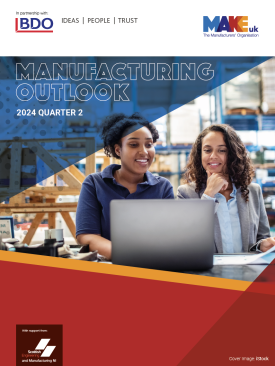4 minute read with link to full report
Output, orders and business confidence all grow according to latest Manufacturing Outlook report
Britain’s manufacturers are seeing a boost in growth prospects as output and orders pick up, with the sector forecast to outpace the economy overall this year, according to a major survey.
The Make UK Q2 Manufacturing Outlook Survey also shows that business confidence has risen to equal its highest level in the last decade, as companies look to finally emerge from a two year slump following the post-covid rebound.
Furthermore, looking forward, the survey shows that manufacturers want the next government to make delivering an industrial strategy its top priority, an issue Make UK also made a priority in its Makers’ Manifesto published ahead of the forthcoming election. Such a strategy must have a skills revolution at its core, with Make UK warning that a shortage of skills is now a critical issue for many companies, not just affecting their growth but the ability to maintain daily operations and fulfil contracts. According to official data, there are currently 64,000 vacancies in manufacturing which Make UK estimates is costing £6bn in lost output. Vocational skills are a particular concern caused largely by a significant reduction in Level 2 and 3 engineering apprenticeships.

The latest Manufacturing Outlook report highlights growth in production output and orders with business confidence currently at its highest level for a decade – Make UK is now forecasting the sector will outpace the economy overall in 2024 / Picture: Getty/iStock
Never miss the latest manufacturing news by signing up to our newsletter here
In addition, the survey shows strong support for the next government to smooth out the barriers felt by businesses on both sides of the channel since the Trade and Cooperation Agreement came into force by forging stronger relations with the EU, which remains by far the largest market for UK manufacturers.
James Brougham, senior economist at Make UK, said: “At long last, manufacturers can see concrete signs of growth and a much better economic outlook ahead. With prices cooling and, potential cuts in interest rates to come, the next government must capitalise on this scenario by delivering a modern, long term industrial strategy which goes beyond the 2030s and has cross-government support. This must be supported by a revolution in skills, a shortage of which is the biggest factor affecting not just companies’ growth prospects but, in many cases, their ability to maintain daily operations and fulfil contracts. This must now be a national endeavour and begin with a fundamental review of the Apprentice Levy and wider vocational training system.”
According to the survey, the balance on output increased from +5% in Q1 to +9% in Q2 but is forecast to jump to +30% in the next quarter. Total orders are following a similar pattern, increasing from +7% in Q1 to +14% in Q2 and then jumping to +32% in the next three months. Export orders (+10%) exceeded UK orders (+2%) highlighting how the UK continues to depend on global value chains for its success but, the pattern since the pandemic when UK orders have consistently exceeded export orders is forecast to resume in the next quarter at +25% and +24% respectively.

Recruitment is forecast to jump as demand increases but Make UK is warning that a shortage of skills is now a critical issue for many companies / Picture: Getty/iStock
The scramble to attract and retain talent also shows no signs of abating, with recruitment intentions increasing from +8% to +26% as companies take on staff to meet the expected increase in demand and better economic outlook. Business confidence has also risen to equal the highest level recorded since the survey started measuring the indicator in 2014. The only previous occasion it reached the current level was during the immediate post-covid rebound. Investment intentions moderated however from +15% to +11%.
The survey also asked companies to list their top three priorities for the next government. More than two thirds of manufacturers (69.1%) said delivering an industrial strategy was the top priority, more than half (54.2%) said stronger EU/UK relations, while almost half (44%) said reducing the business tax burden. This was followed by investment in national infrastructure (31.5%) and reforming the Apprentice Levy (24.1%). Make UK is forecasting that manufacturing will grow by 1.2% in 2024 with GDP growing by 0.9%.
